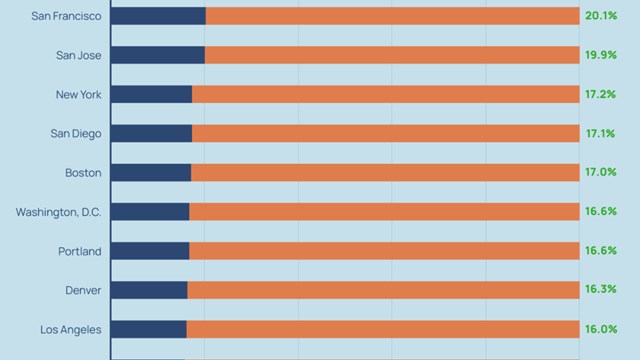As the future of the economy remains questionable, the matter of your building’s finances begs the question: Should your co-op or condo board reexamine how you invest your reserve fund? No doubt, this has already crossed your mind, but even if it hasn’t, perhaps now is a good time to reassess your reserve fund investment strategies.
A co-op or condo’s reserve fund should include adequate provisions for maintenance, major capital improvements, unexpected repairs, or replacement of building systems, should your regular operating budget fail to cover these expenses. This specific amount kept in reserve may differ from building to building. If the fund is large enough, there may be no need for the complication and bother of increased maintenance fees, loans, and suchlike to meet unexpected expenses. Investigating different types of strategies and investing the money properly will ensure that your reserve fund will grow and meet the needs of your building.
The Basics
"The board has a fiduciary responsibility," says Carl Cesarano, a CPA and partner with Cesarano & Kahn PC in Queens, "and it’s up to them to investigate different avenues of investing." How and where your board invests the reserve fund is a decision that board members and your treasurer should make. Seeking the guidance of a financial advisor is a good idea if you’re unfamiliar with investing strategies, or if you seek to go beyond the traditional investment vehicles such as certificates of deposit (CDs) or government securities. Checking out all possible options before making a decision should give you a good grasp of your options.
To begin with, keep your reserve funds separate from your other accounts. This is not money you want intermingled with other assets. In addition, the board–and not the managing agent–should control the funds. Marc Taub, an accountant with Ellenbogen Rubenstein Eisdorfer & Co. LLP in Manahttan, advises requiring a dual signature in the event you need to access the money. This provides the board greater control over the reserve fund and also works as an anti-fraud policy. Taub also advises your board review your reserve fund at least annually, when your budget is determined. The treasurer should report the state of the reserve fund at the annual shareholders meeting.
Determining the Length of Investment
Understanding the conditions that pertain to your particular building will give you a good idea of the length of time you want to invest your reserve fund. For starters, do a physical checkup on the building. According to Cesarano, it’s really an engineering issue; are capital improvements needed? What is the condition of the infrastructure, the roof, the façade, and so on, and will these areas require repairs in the immediate future? Are you going to be making major capital improvements over the next few years, or is most of the major repair work already completed? In short: How soon and often are you going to need to have access to the reserve fund?
If you’re aware that you’re going to be in need of a hefty sum for repairs and improvements over the next three years, don’t invest in something that will keep most of your funds tied up for six years. Says Taub, "You don’t want to make an investment you will have to liquidate," because your investment strategy did not complement your short-term goals. "Your investment should be coordinated with the needs of the building."
Looking at the present state of your building, as well as looking ahead to future projects is a key component when deciding on the length of your investment. For instance, a board that has completed all the major refurbishing and renovations for the foreseeable future does not necessarily need access to the bulk of the reserve fund. In this case, perhaps the board will leave $100,000 in a short-term CD, while a larger amount is invested in something long-term. It is crucial to examine your long-term needs. This is not only the first step in determining the length of investment; it will also help you choose which type of investment you want to make. Once you’ve assessed the state of your building, determine if your funding is adequate to meet your goals.
What Should You Invest In?
Since the board handles the fund and makes the investments, it is up to the board to invest wisely, and in a manner that will best serve the needs of the building. A reserve "fund" does not necessarily have to be one large account. Investing in several types of products and dividing assets into various accounts can be beneficial. Assuming you already know the state of your building, you now have a map of what the next few years will look like–or at the very least, you’ve got a good idea of where and when money will be needed. Taub suggests that an accountant can play a role in strategizing your accounts–assisting your board in deciding how much money should go where, and so on.
If you have several different types of investments, "you can break them up into different maturities, so they come due at different times," says Cesarano. Planning ahead will certainly give you an edge when allocating your funds into investment vehicles of different maturity rates. Taub suggests that boards consider three different types of investments: short-term (one to three years), long-term (six years or more), and a time period in between long- and short-term (three to six years).
Says Taub, "Look at the needs of the building and the cash flow." Boards are generally very conservative in their investments. Investments in treasuries, CDs, and other low-risk vehicles are common. It is highly unusual–and not recommended–for a board to invest in something volatile or risky such as the stock market.
Take a look at the mortgage and find out if there is any kind of prepayment penalty. The current low interest rates have spurred many people to refinance their mortgages. Determine if it would be beneficial to refinance your mortgage with lower rates. Taub also suggests keeping an equity or credit line with the building so you have something to draw out of if necessary.
Beyond Your Local Bank
Carl Cesarano suggests boards resist the urge simply to go to the bank in closest proximity to their building. "Don’t just use the one down the street." Since boards generally want to play it safe and avoid anything that will result in a loss, Cesarano recommends boards ask questions like, "How do I maximize the best return on a low-risk product? How do I get a better deal?" Cesarano says that consulting a brokerage firm to do the initial investigating could not only save you some time and energy, but also result in getting a better return on your money.
Craig Mandel, vice president of Merrill Lynch’s Manhattan-based offices, concurs with Cesarano. "Keeping the reserve fund in a bank is definitely not the right answer. Local banks will give you their rate," says Mandel. "[A brokerage] can find you a bank in Kansas that may offer more." Mandel also suggests boards look into setting up a Working Cash Management Account (WCMA), a money-market account that yields about two percent interest from the day of deposit. Putting money in a WCMA–as opposed to a bank–will provide you with the opportunity to do checking, investing, financing, and online business from one account. "It’s more user-friendly," says Mandel, since you’re able to work out of a single account. One benefit of a WCMA account is that it sweeps incoming cash into a money-market account where it will earn interest or dividends. There is also no minimum amount of money required for the account to earn interest.
Along with the WCMA, Mandel sees many co-op and condo boards making investments in CDs and government-backed treasuries. Although they may provide a lower return on investment than some of the more risky products out there, Mandel notes that boards typically like these sort of investments because they’re safe. Again, although the experts may disagree on what type of investment is best, there is one idea they all seem to agree on–co-ops and condos should not risk investing the reserve fund in the stock market.
Preventing Fraud
It’s an alarming thought, but fraud does occur. So how should you protect your assets? Barbara Strauss, senior vice president of York International Agency, Inc., an independent insurance agency in Yonkers, New York, recommends purchasing a fidelity bond. According to Strauss, a fidelity bond can protect the corporation from the theft of money or property by employees, board members, or the managing agent. It’s basically an insurance policy written in the name of the co-op or homeowner association that can protect the corporation from theft, such as kickbacks. However, keep in mind that this insurance does not cover carelessness in handling money–there must be evidence of financial benefit by the person or persons committing the fraud. Strauss recommends boards carry at least two month’s maintenance receipts as a minimum amount of Fidelity Insurance.
What works for one building’s reserve fund may not be the right solution for your board’s investment needs. Know the condition of your building and consider several options before settling on the best choice or choices for your particular building. Going the extra mile and investigating different strategies may take extra legwork now, but it can pay off later–literally.
Ms. Mannino is a freelance writer living in New Jersey.







5 Comments
Leave a Comment